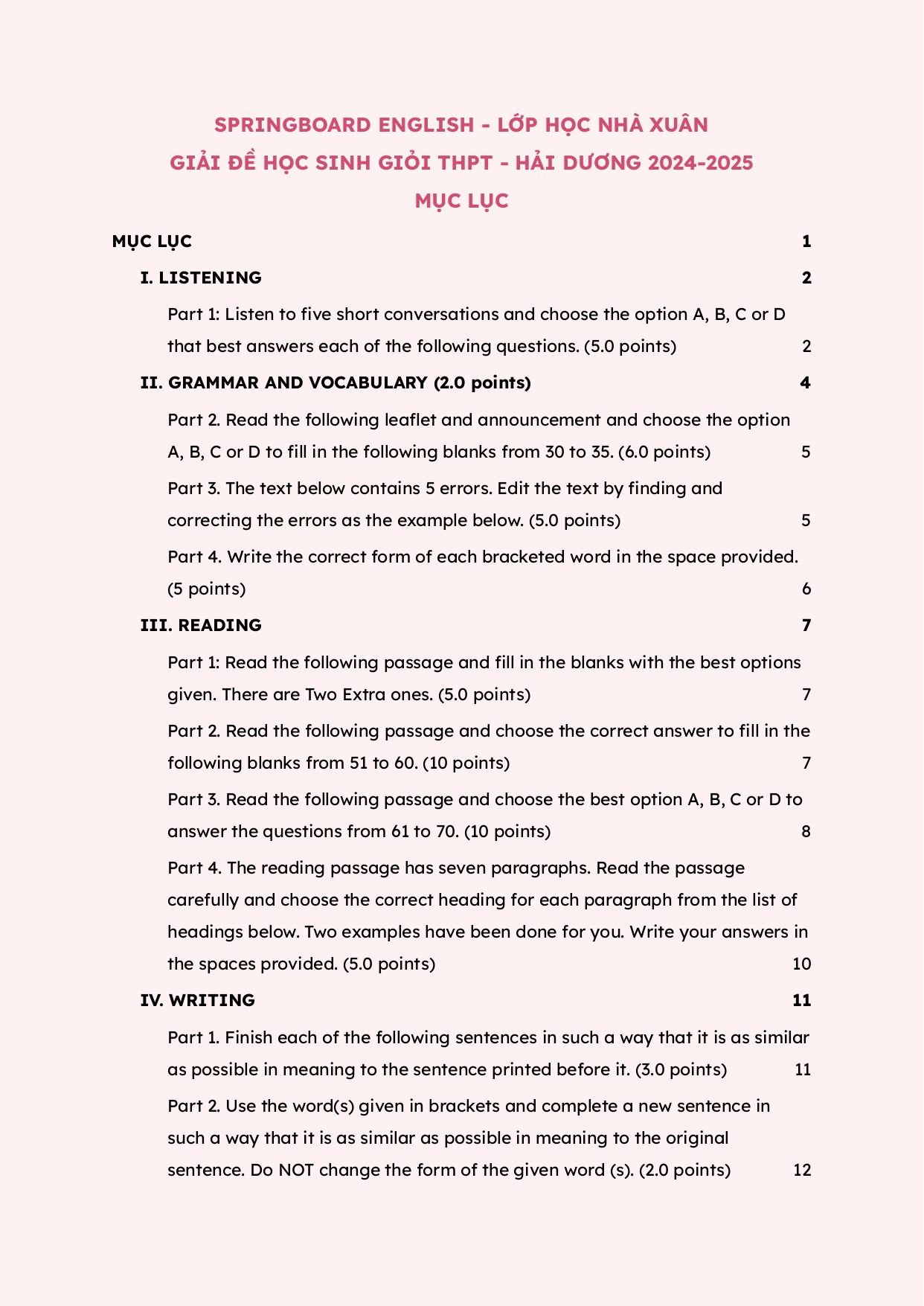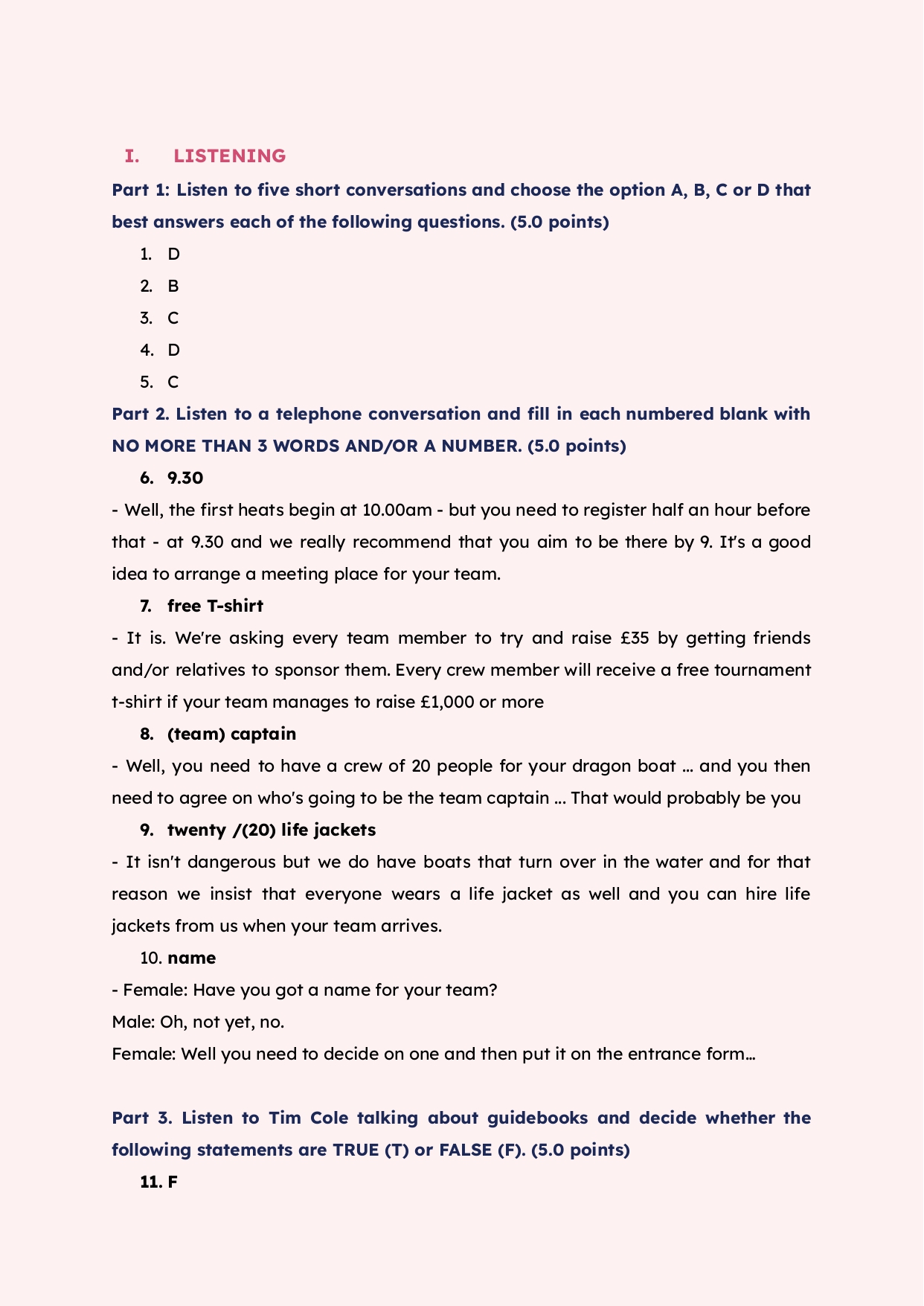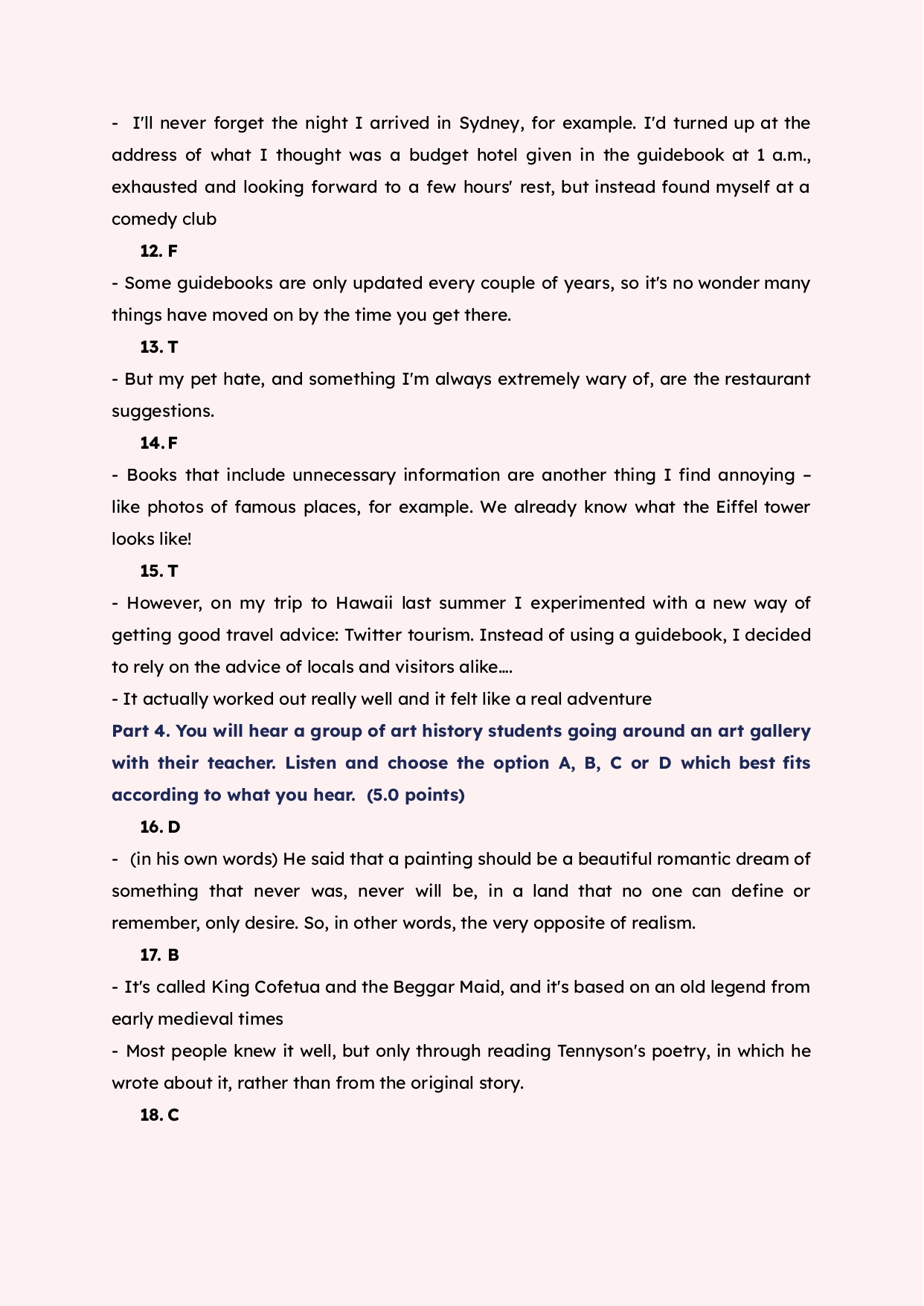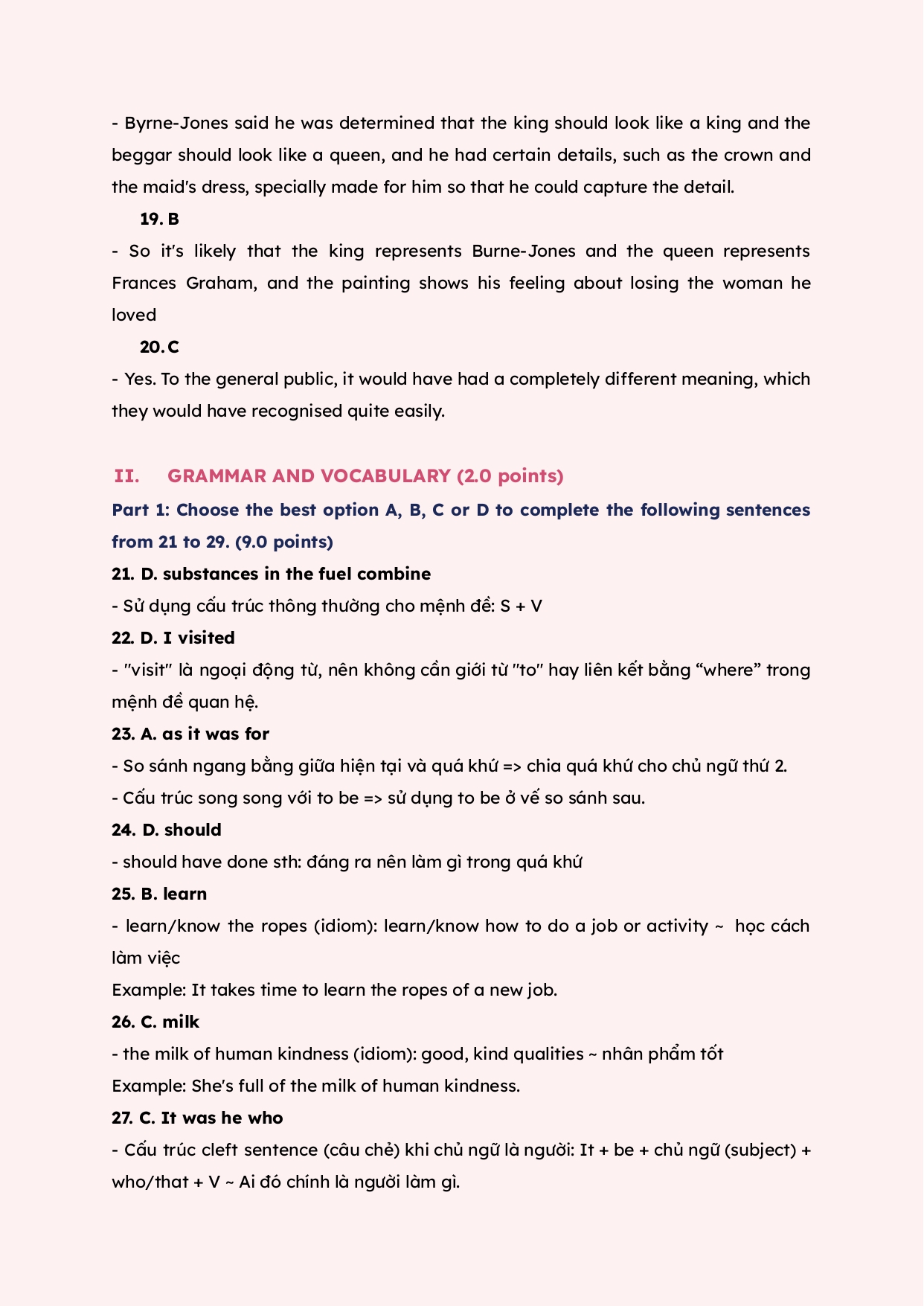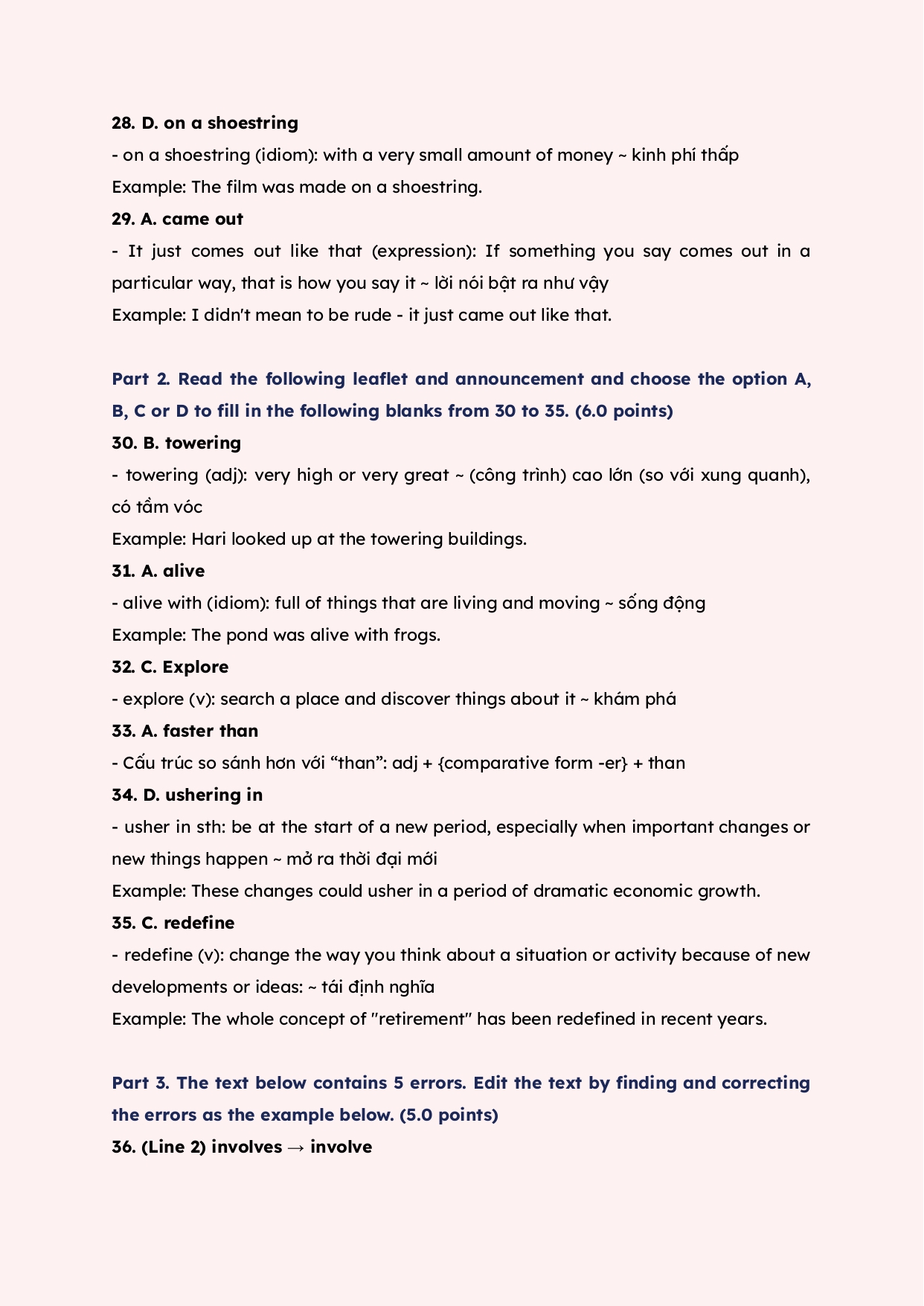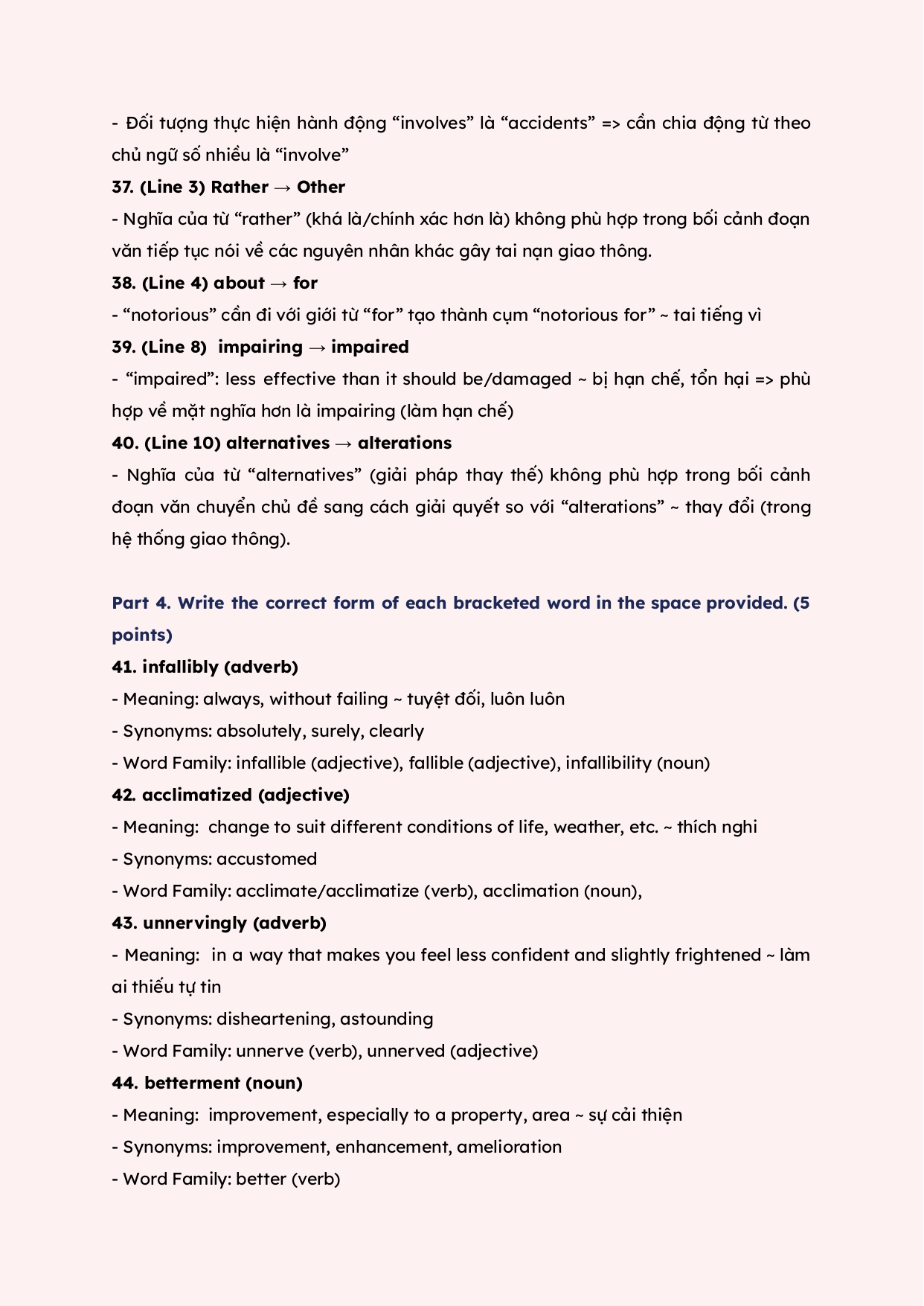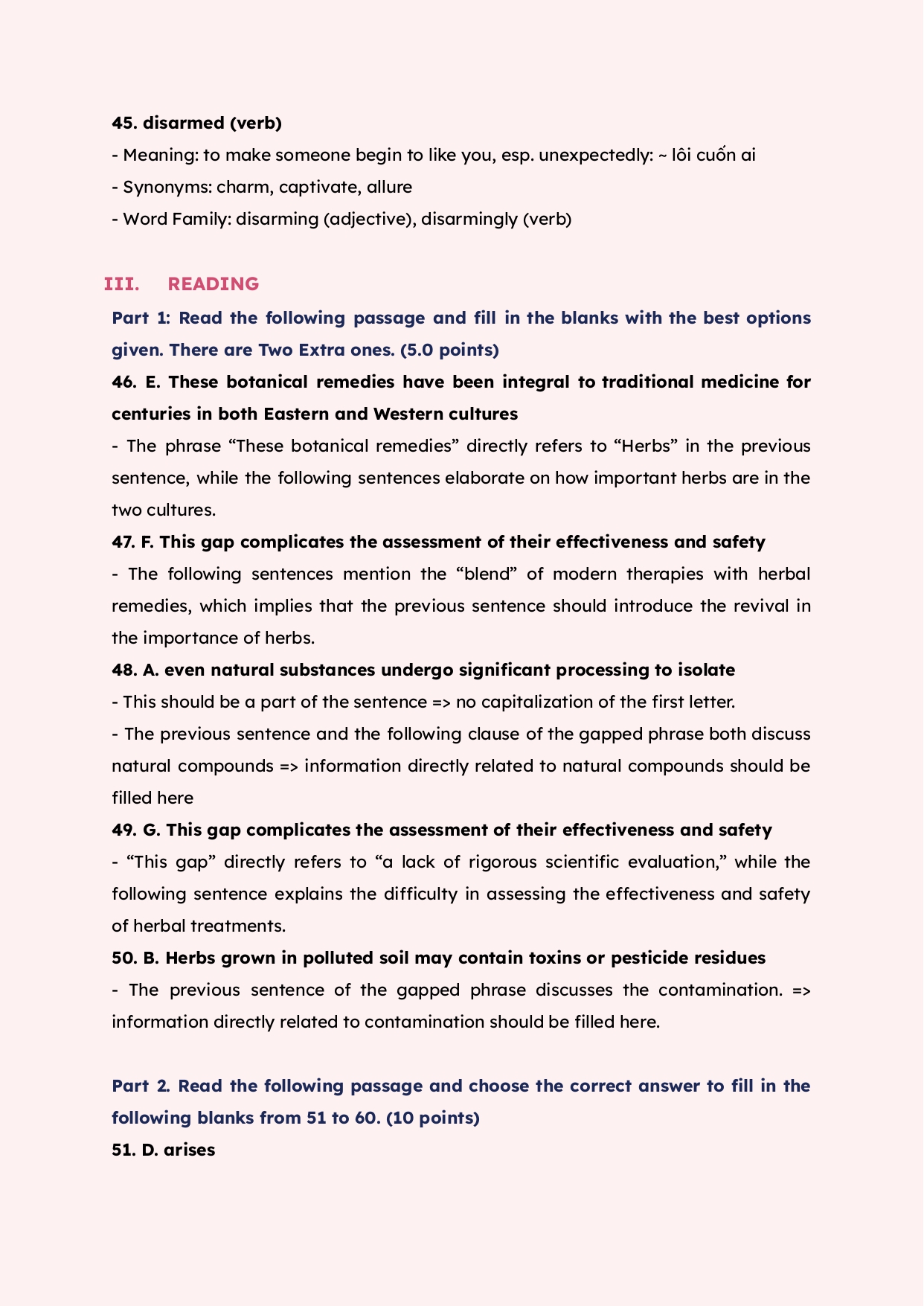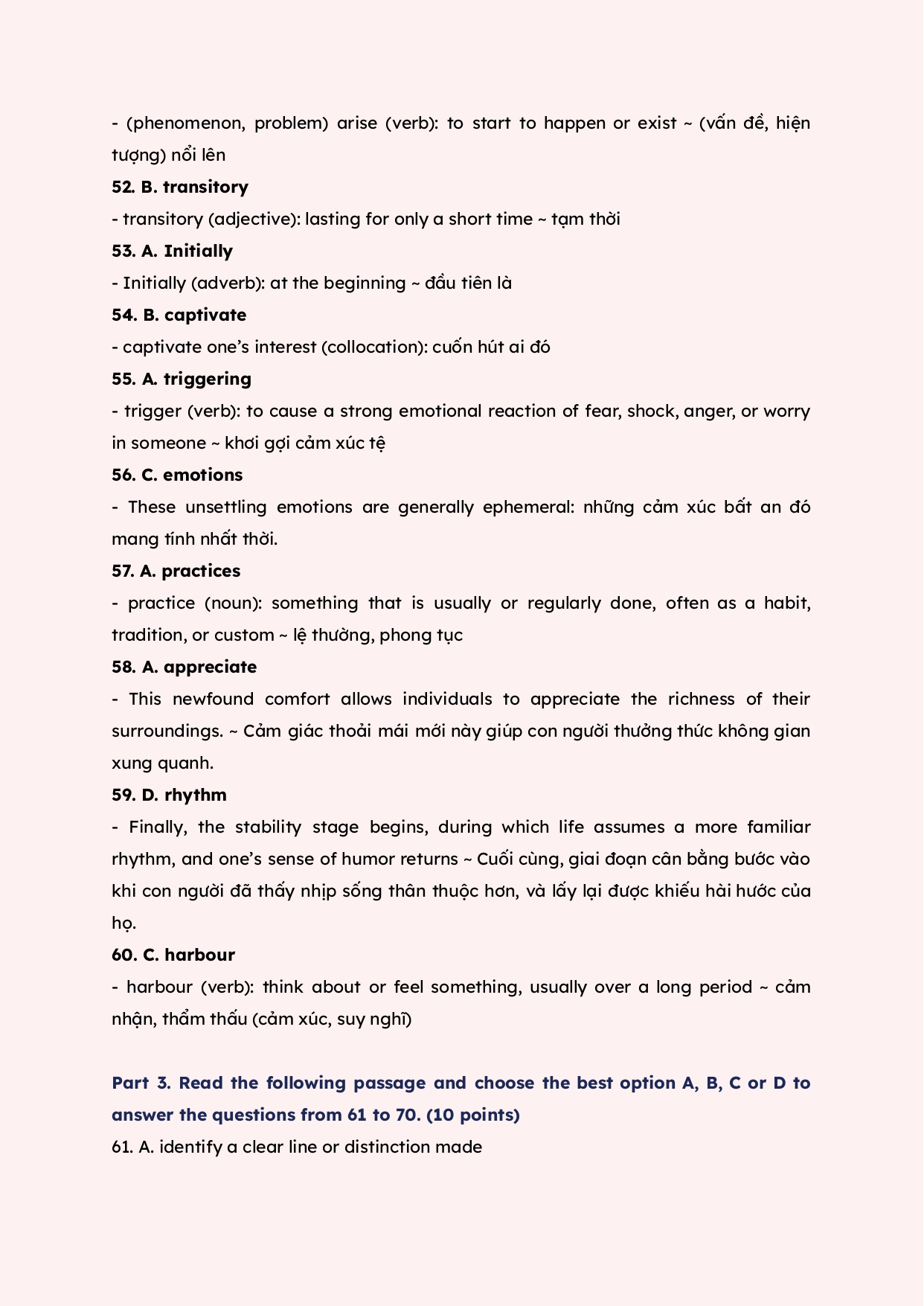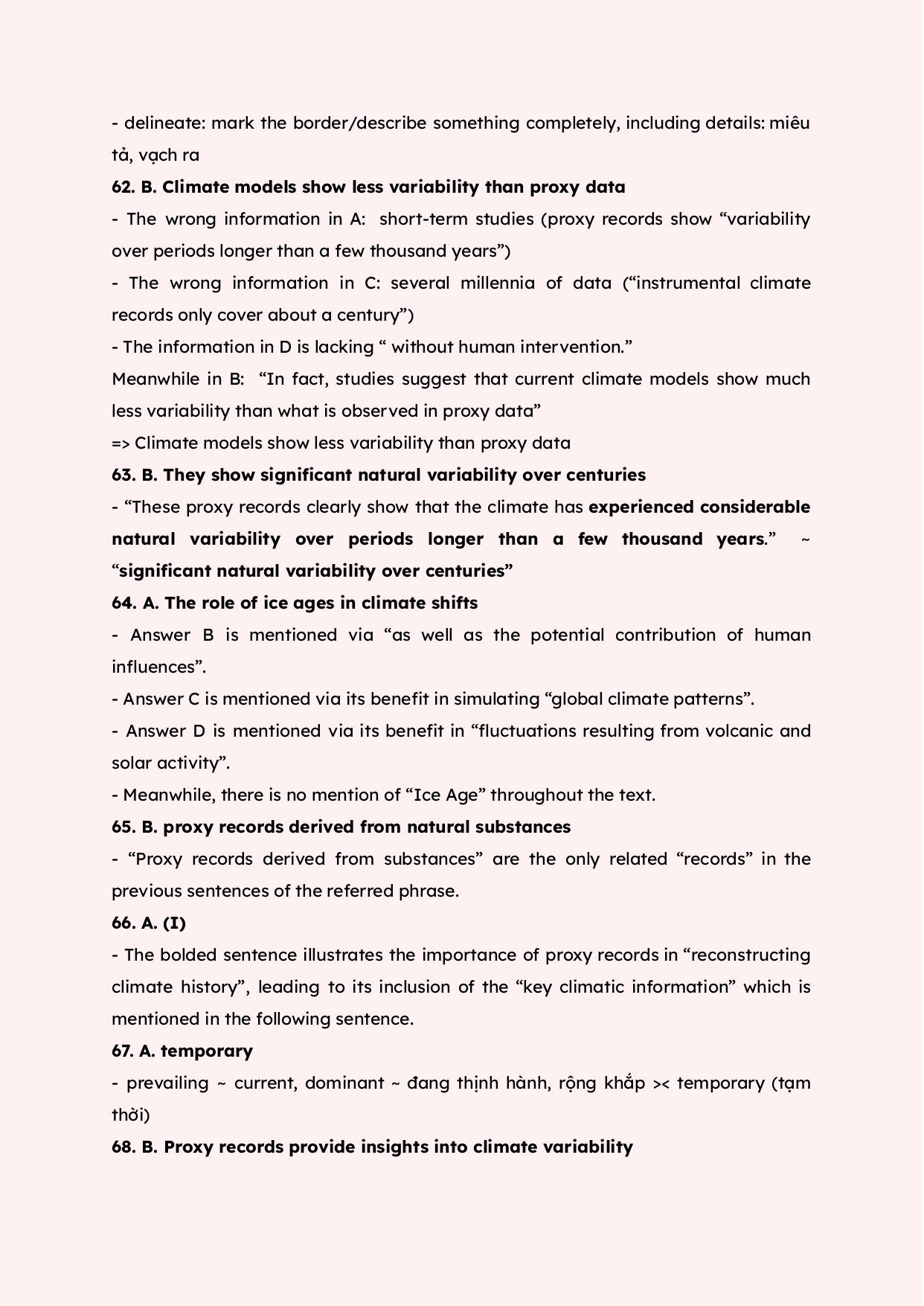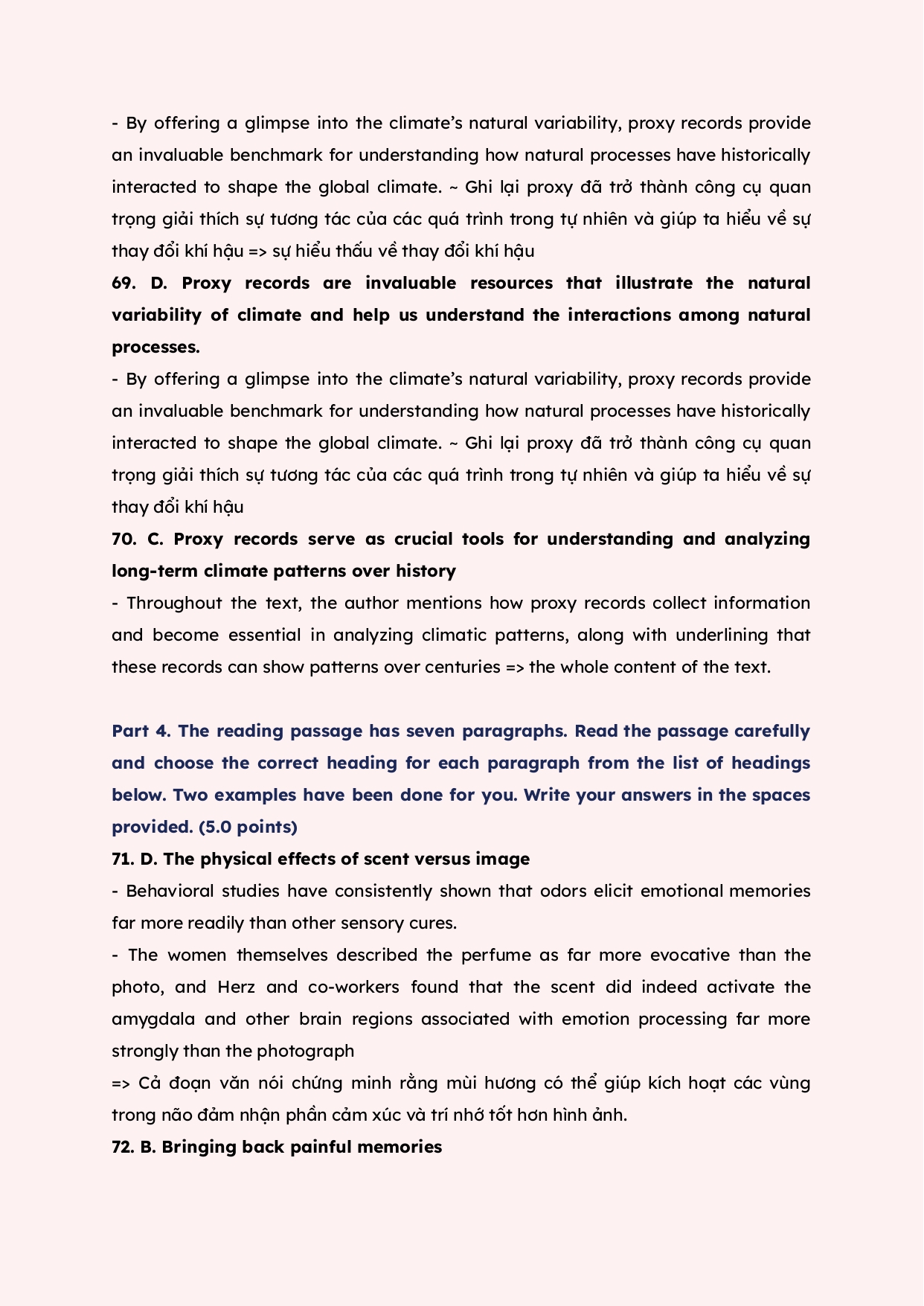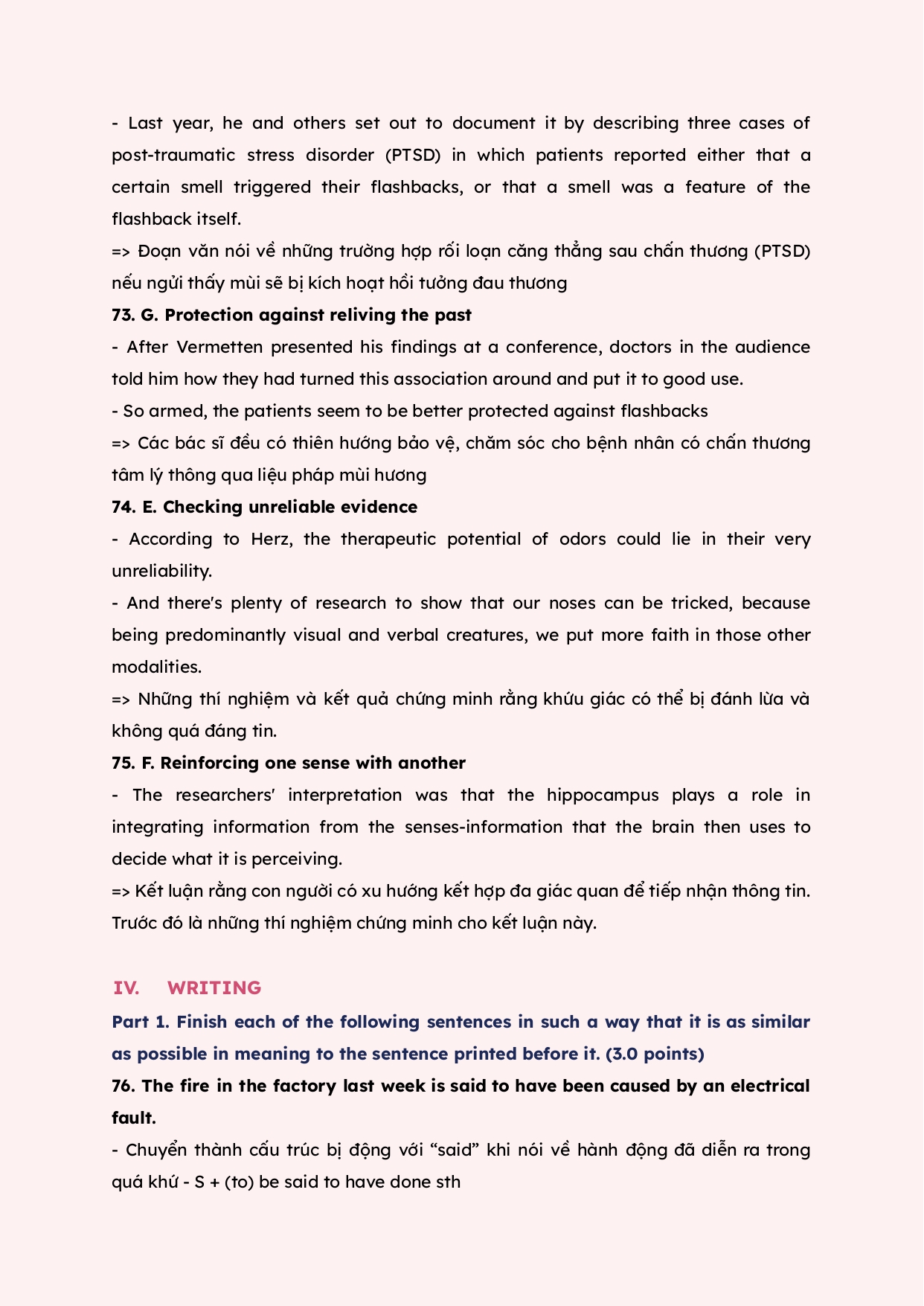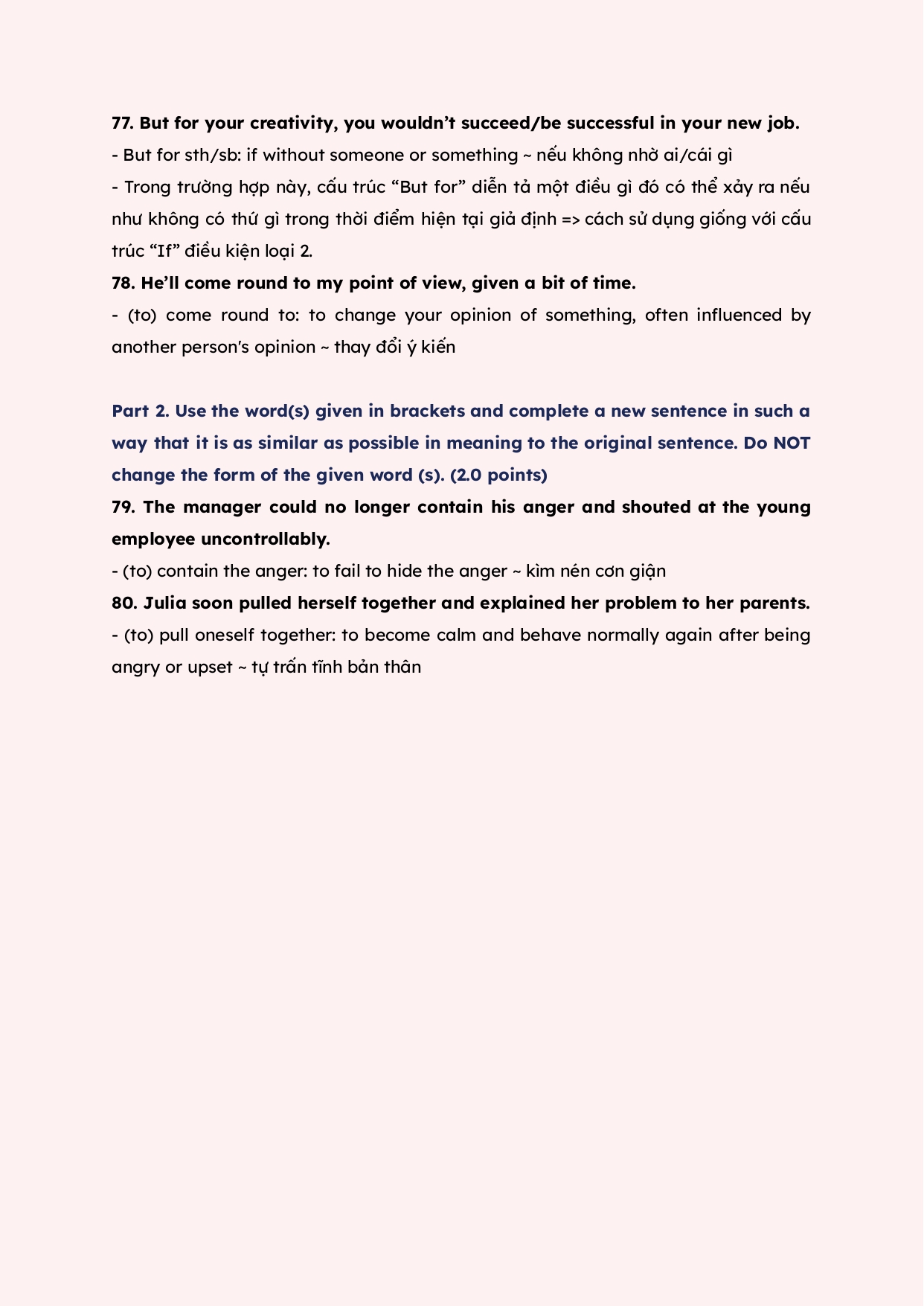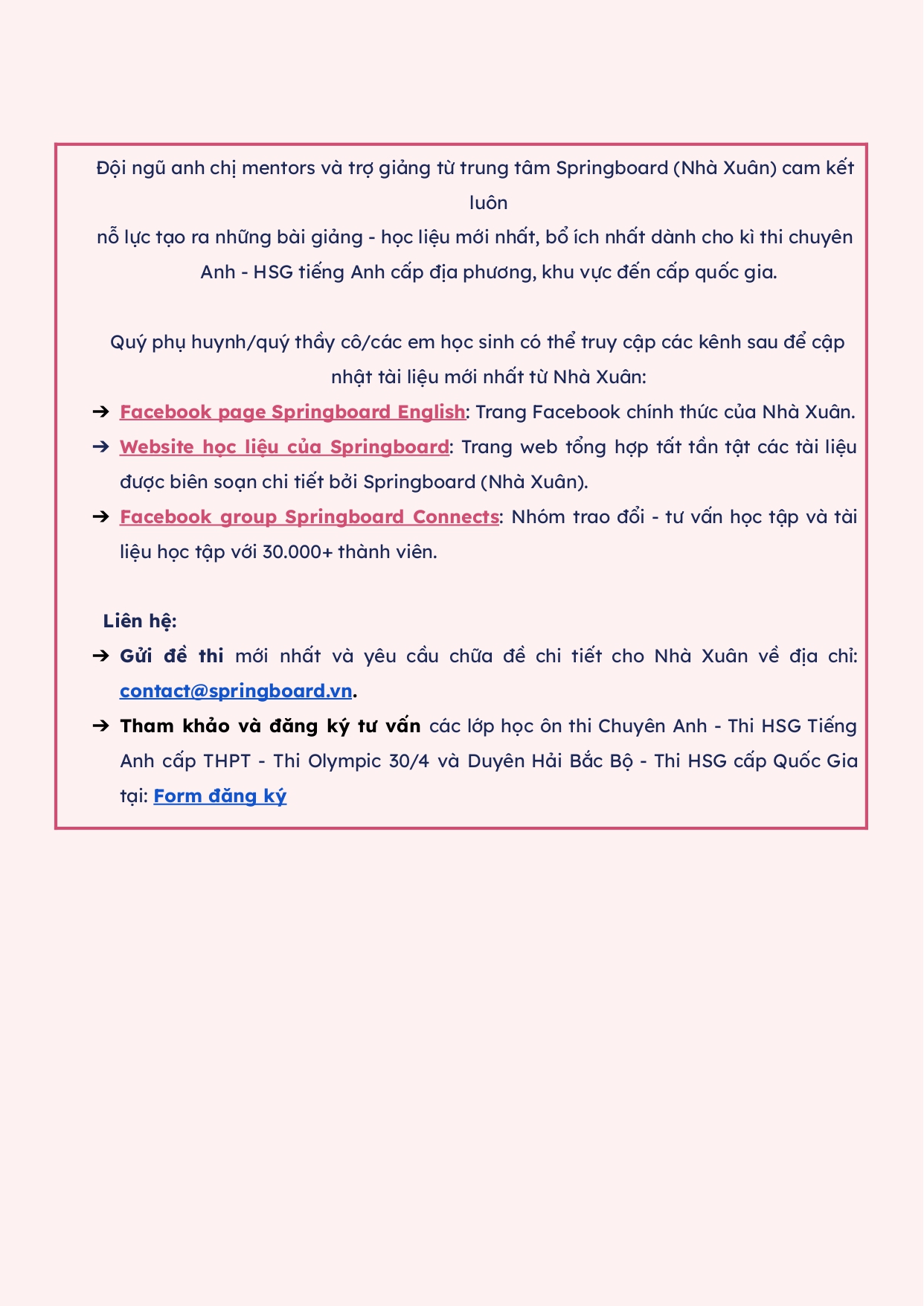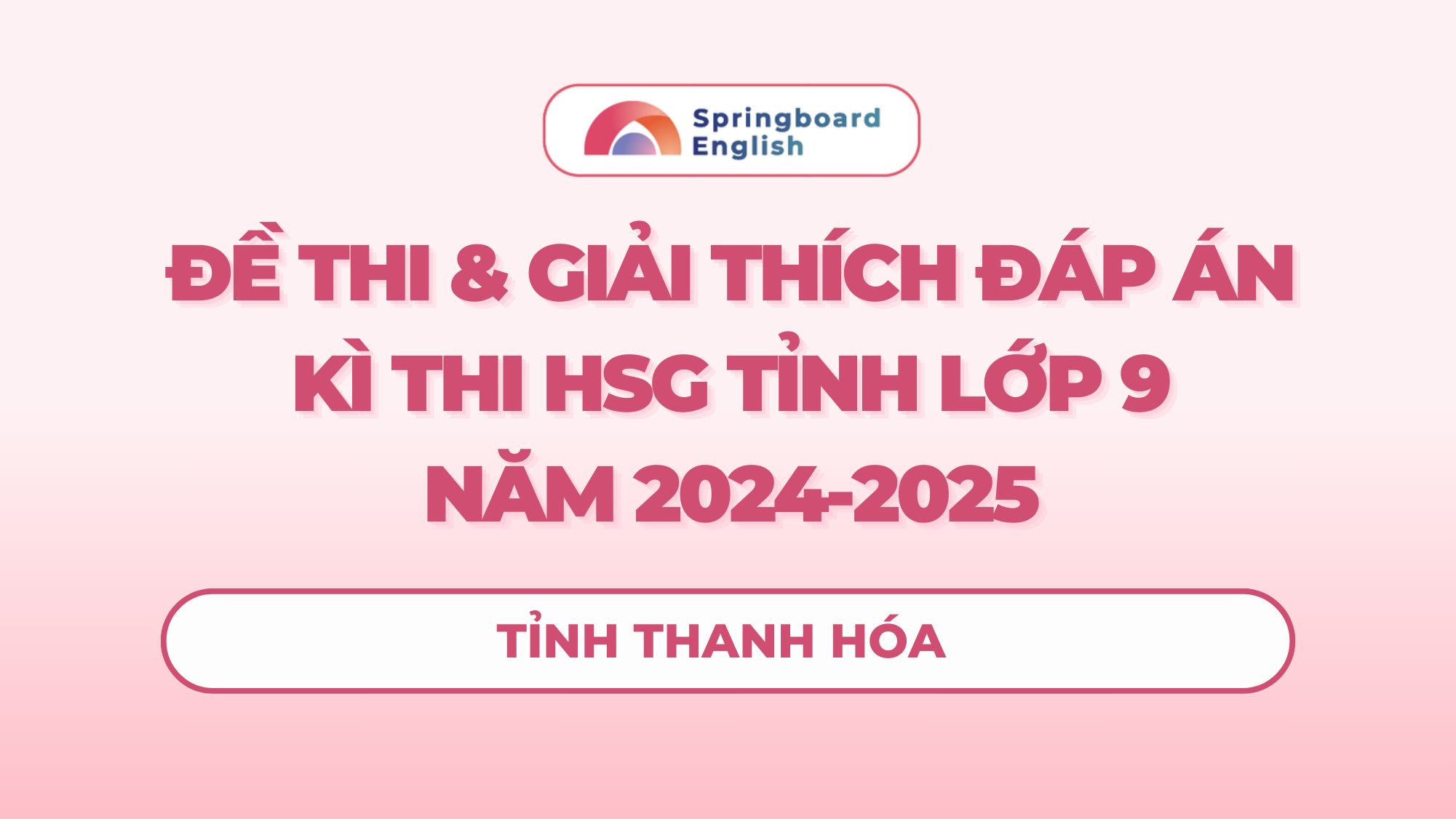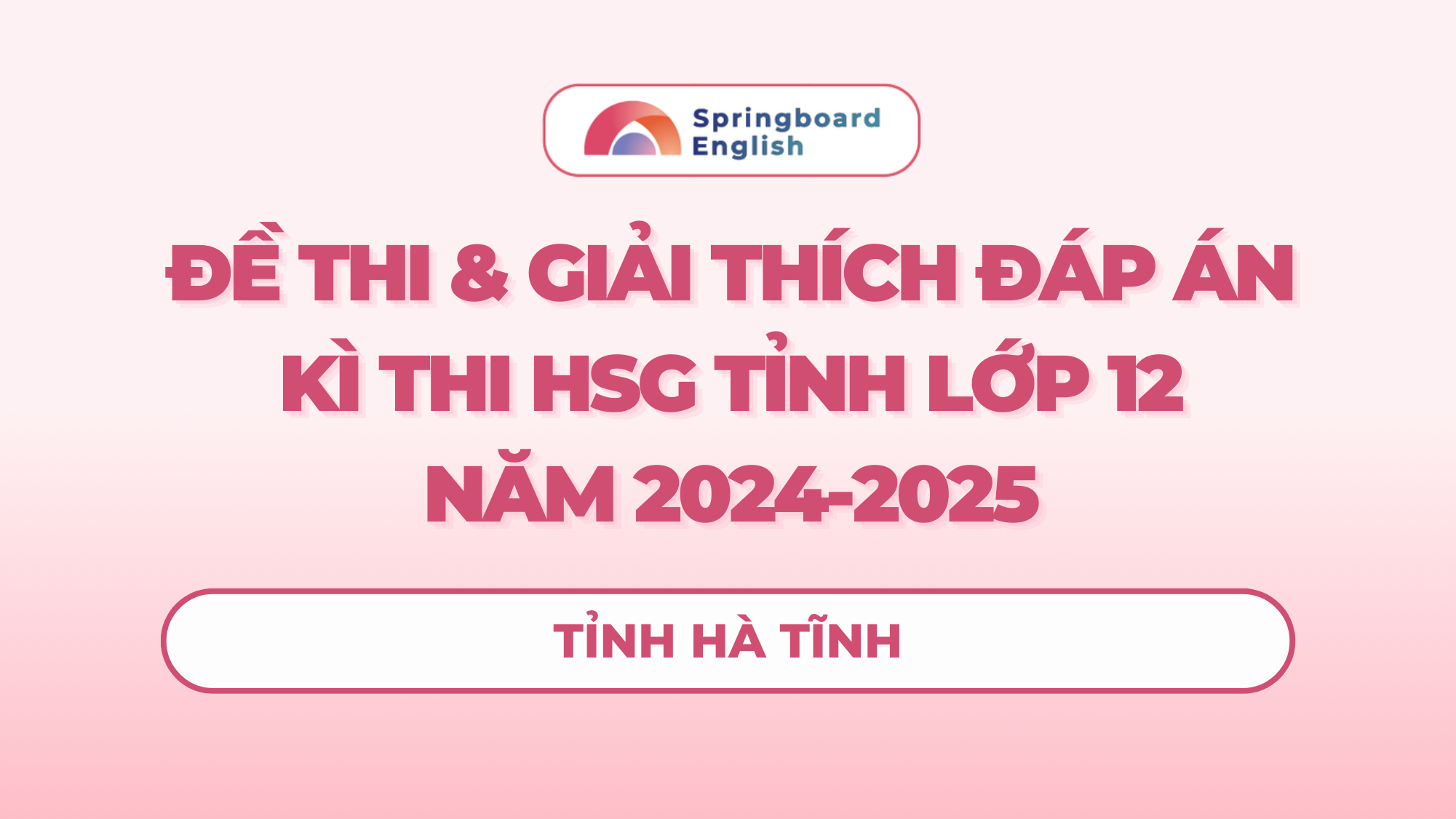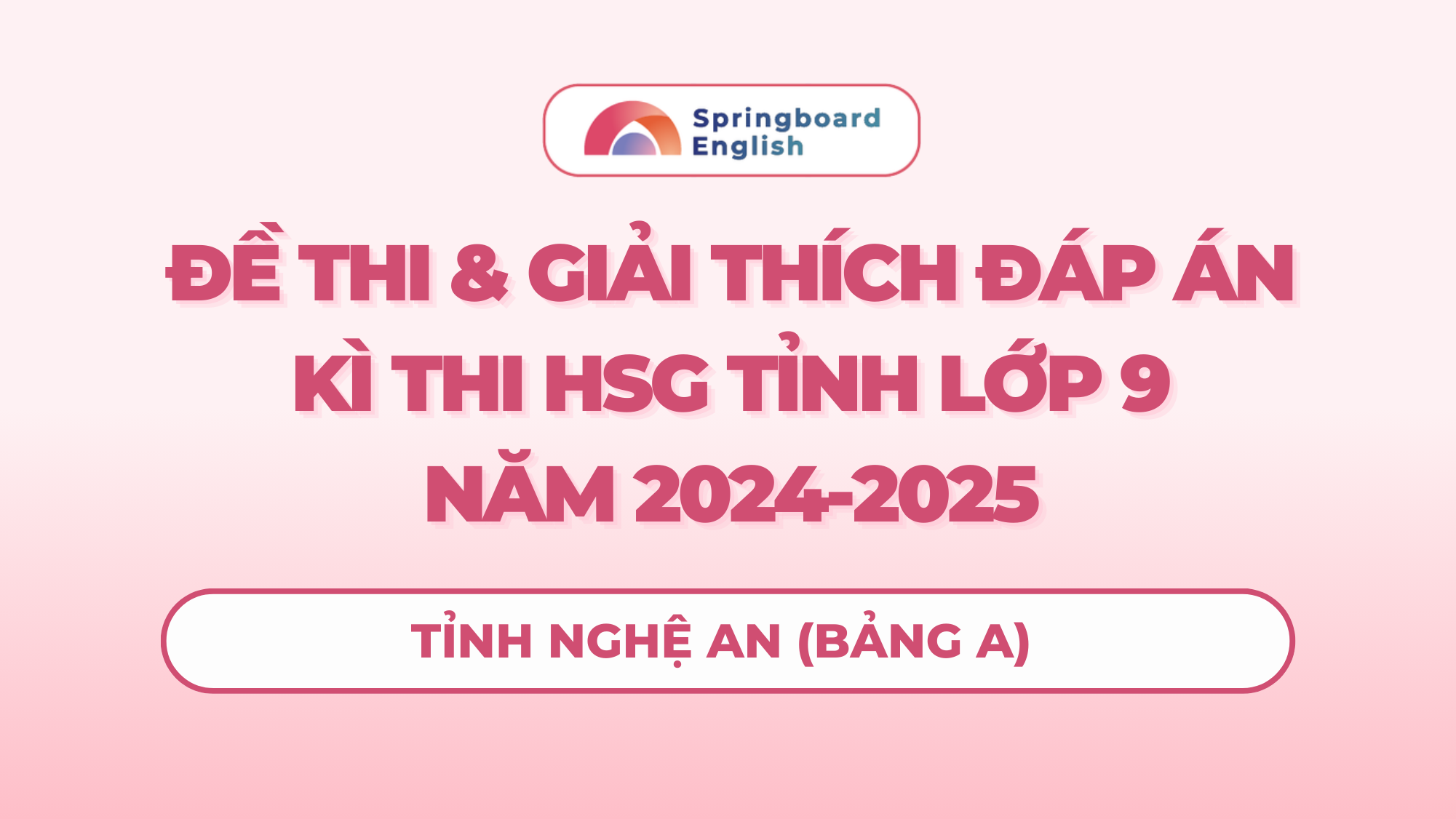Đề thi và Đáp án Chi tiết Kì thi Chọn HSG Tỉnh lớp 12 - Tỉnh Hải Dương năm học 2024-2025
Trong bài viết này, Đội ngũ trung tâm Springboard (Nhà Xuân) xin chia sẻ đến các quý phụ huynh, thầy cô, các em học sinh Đề thi và Đáp án có giải thích chi tiết ở kì thi chọn học sinh giỏi tỉnh Tiếng Anh lớp 12 – tỉnh Hải Dương năm học 2024-2025.
Phần đáp án chi tiết được giới thiệu ở bài viết này là tài liệu được biên soạn trực tiếp bởi đội ngũ chuyên môn Nhà Xuân, đồng thời là bản cập nhật mới nhất trong năm 2025.
Kéo xuống dưới cùng để xem hết đáp án có giải thích chi tiết.
Phần nghe - Đề thi chọn HSG lớp 12 tỉnh Hải Dương năm học 2024-2025
Đề thi HSG Tiếng Anh lớp 12 - tỉnh Hải Dương năm học 2024-2025
SỞ GIÁO DỤC VÀ ĐÀO TẠO HẢI DƯƠNG
| KỲ THI CHỌN HỌC SINH GIỎI LỚP 12 THPT CẤP TỈNH NĂM HỌC 2024 – 2025 Môn thi: TIẾNG ANH Ngày thi: 29/10/2024 Thời gian làm bài: 180 phút, không tính thời gian phát đề Đề thi gồm 09 trang |
CHÚ Ý:
Thí sinh làm bài vào tờ giấy thi
Phần trắc nghiệm: Chỉ cần viết chữ cái A, B, C, … ứng với phương án trả lời.
Phần tự luận: Viết đầy đủ theo yêu cầu của bài.
(Thí sinh không được sử dụng bất cứ tài liệu gì.)
LISTENING
Hướng dẫn làm bài Nghe:
Bài Nghe gồm có 04 phần, mỗi phần thí sinh được nghe 02 lần. Mở đầu và kết thúc phần nghe có tín hiệu nhạc.
Mọi hướng dẫn cho thí sinh (bằng tiếng Anh) có trong bài.
Listen to five short conversations and choose the option A, B, C or D that best answers each of the following questions. (5.0 points)
Question 1. Who is the message intended for?
people leaving Britain B. people in Britain
foreigners to Britain D. people returning to Britain
Question 2. What are the speakers discussing?
a university course B. a conference schedule C. a TV programme D. a renovation plan
Question 3. What time will John and Betty arrive at the party?
7.30 B. 8.30 C. 9.30 D. 10.00
Question 4. How long has Derek been working?
for half an hour B. since 7 o’clock C. for 7 hours D. since noon
Question 5. What did the woman buy?
an armchair B. a sofa bed C. a wardrobe D. a dining table
Listen to a telephone conversation and fill in each numbered blank with NO MORE THAN 3 WORDS AND/OR A NUMBER. (5.0 points)
DRAGON BOAT RACE Event Details
Race details
Sponsorship
Team details
|
III. Listen to Tim Cole talking about guidebooks and decide whether the following statements are TRUE (T) or FALSE (F). (5.0 points)
STATEMENTS | T | F |
Question 11. Once, when Tim used a guidebook in Australia, it took him ages to find the place he was looking for. | ||
Question 12. Tim believes the problem with guidebooks is that some of them are very poorly researched. | ||
Question 13. The thing Tim particularly dislikes about guidebooks is the recommendations about where to eat. | ||
Question 14. Other things which should be included in guidebooks are good pictures of well-known tourist sites. | ||
Question 15. What Tim likes about Twitter tourism is the advice from other travelers was extremely helpful. |
You will hear a group of art history students going around an art gallery with their teacher. Listen and choose the option A, B, C or D which best fits according to what you hear. (5.0 points)
Question 16. Burne-Jones believed that a painting ________.
ought to be true to nature
must have a clear moral point
should play an instructive role in an industrialized society
need not have any practical value
Question 17. It appears that the story of the King and the Beggar Maid was ________.
a well-known Victorian tale
popularized by a poet
brought to the artist’s attention by his wife
taken up by novelists at a later stage
Question 18. According to the student, how did the painter approach the work?
He wanted to portray the beggar very realistically.
He copied parts of the painting from an Italian masterpiece.
He had certain items in the painting made for him.
He wanted to decorate the clothing with jewels.
Question 19. The student thinks that in some way the painting depicts ________.
an uncharacteristically personal message
the great sadness of the artist
the artist’s inability to return the girl’s love
the fulfillment of the artist’s hopes and dreams
Question 20. What was people’s reaction to the painting?
They recognized Frances Graham as the model for the Beggar Maid
They realized how personal the painting was for the artist
They interpreted the painting without difficulty
They did not approve of the subject matter of the painting
LEXICO & GRAMMAR
Choose the best option A, B, C or D to complete the following sentences from 21 to 29. (9.0 points)
Question 21: When wood, natural gas, oil, or any other fuel burns, _______ with oxygen in the air to produce heat.
a combination of substances in the fuel B. combining substances in the fuel
substances in the fuel that combine D. substances in the fuel combine
Question 22: The first village _______ was not far from my city.
where I visited B. that I visited to C. to which I visited D. I visited
Question 23: Buying a first home is still a milestone for many young couples, ______ earlier generations.
as it was for B. like that of C. so have D. as did
Question 24: When we got to the island, we realized that the water was not safe to drink and that we________ have brought water purification tablets.
would B. must C. could D. should
Question 25: After a month of apprenticeship, I hope to ________ the ropes and won’t keep bothering you for help.
study B. learn C. grasp D. hold
Question 26: In some movies, a stepmother is often described as a completely hard and selfish person, not having the ______ of human kindness.
tear B. flesh C. milk D. blood
Question 27: _________ kept beeping the car horn loudly and the other drivers got annoyed.
It is him that B. He was the one C. It was he who D. The one who
Question 28: The film, which was made , surprised everyone by winning three Oscars, including the one for Best Picture.
up to speed B. all in good time C. under the counter D. on a shoestring
Question 29: He apologized for having accidentally hurt me, saying that it just ______ like that.
came out B. went out C. broke out D. missed out
Read the following leaflet and announcement and choose the option A, B, C or D to fill in the following blanks from 30 to 35. (6.0 points)
Discover the Timeless Beauty of Southern Spain!
To secure your place on this unforgettable adventure, contact us at:
Your unforgettable journey awaits! |
Question 30: A. rewinding B. towering C. soaring D. ascending
Question 31: A. alive B. cool C. deep D. acute
Question 32: A. Notice B. Detect C. Explore D. Investigate
Embark on the Future: Viettel 5G Launch Day! Join us on October 15th for the momentous unveiling of 5G technology – set to revolutionize connectivity! Key Features of 5G:
Seize the opportunity to witness how 5G will (35) ______ our digital landscape! Location: Viettel Office, Hanoi Step into a new era with 5G! |
Question 33: A. faster than B. faster and faster C. the fastest D. so fast as
Question 34: A. catching up B. clinging on C. stemming from D. ushering in
Question 35: A. retrieve B. reproduce C. redefine D. refrain
III. The text below contains 5 errors. Edit the text by finding and correcting the errors as the example below. (5.0 points)
Lines | |
1 | It was the human factor that contributes to the absolute majority of road |
2 | accidents which involves the tremendous toll of fatalities each year. |
3 | Rather, less decisive, causes are vehicle malfunctions or road shortcomings. |
4 | Speeding motorists are notorious about failing to give way at junctions, |
5 | misjudging the situation on the road or being unable to accurately estimate |
6 | the distance while overtaking the “snailpacers” ahead. Drinkers settling |
7 | behind the wheel after one glass or two may be running the risk of causing |
8 | a tragedy through their impairing perception, which is not so rare a case, |
9 | again. Unfortunately, it is much simpler to introduce the necessary |
10 | alternatives in the traffic system than change the behavioral patterns of |
11 | drivers. There are voices that more severe disciplinary resolutions ought to |
12 | be put into practice if vehicle users are to benefit from greater security |
13 | on the road. |
Questions | Mistakes | Correction |
Example | Line 1: was | is |
Question 36 | Line ______________________ | ______________________ |
Question 37 | Line ______________________ | ______________________ |
Question 38 | Line ______________________ | ______________________ |
Question 39 | Line ______________________ | ______________________ |
Question 40 | Line ______________________ | ______________________ |
Write the correct form of each bracketed word in the space provided. (5 points)
Question 41: Despite my father’s difficulties in life, he is _____ (fall) cheerful, showing his optimism in everything he does.
Question 42: More time will be needed for the troops and equipment to become _____ (climate) to the desert conditions.
Question 43: The way she described her dreams was _____ (nerve) vivid, painting a picture of horror that felt all too real to those who listened.
Question 44: Our school teachers have made various radical changes in the teaching procedures for the _____ (good) of the students’ academic performance.
Question 45: The young man always showed his frankness and kindness to Mary, which completely _____ (arm) her.
READING
I: Read the following passage and fill in the blanks with the best options given. There are Two Extra ones. (5.0 points)
LIST OF SENTENCES/ PHRASES
A | even natural substances undergo significant processing to isolate |
B | Herbs grown in polluted soil may contain toxins or pesticide residues |
C | Some herbal remedies have gained popularity due to their perceived fewer side effects compared to synthetic drugs |
D | ongoing research aims to explore the potential benefits |
E | These botanical remedies have been integral to traditional medicine for centuries in both Eastern and Western cultures |
F | Recently, there has been a resurgence of interest in traditional medicine in the West |
G | This gap complicates the assessment of their effectiveness and safety |
Herbs encompass various plants and their parts – such as leaves, stems, roots, and seeds – that are used for medicinal purposes. (46) ______. While Western medicine has largely shifted towards synthetic drugs, herbal treatments remain vital in Eastern practices. (47) ______. Many people are now choosing to blend modern therapies with herbal remedies or adopting these treatments exclusively.
The primary distinction between herbs and pharmaceuticals lies in their composition. Herbs are whole plant parts, while drugs consist of specific chemicals in purified forms. Many contemporary drugs are derived from plant compounds; for example, aspirin is extracted from willow bark. However, (48) ______ and concentrate their active ingredients. This processing allows for precise dosage. Such precision is crucial, as even slight variations can lead to adverse effects, often referred to as side effects.
Despite their appeal, herbal treatments come with challenges, primarily due to a lack of rigorous scientific evaluation. (49) _____ . Since active compounds in herbs are not isolated, determining appropriate dosages can be difficult, increasing the risk of under- or overdose. Moreover, some herbal remedies may provide no real benefit, potentially leading patients to avoid effective conventional treatments.
Furthermore, the unregulated nature of herbal production raises concerns about contamination with harmful substances. (50) ______. Therefore, while herbs may seem more natural than synthetic drugs, they should be approached with the same caution and critical evaluation.
Read the following passage and choose the correct answer to fill in the following blanks from 51 to 60. (10 points)
Culture shock describes the profound discomfort and disorientation individuals experience when adjusting to a new cultural environment. This phenomenon (51) ______ from the need to deal with numerous unfamiliar situations and traditions, leaving newcomers feeling bewildered and powerless. However, understanding the stages of culture shock – and recognizing that these feelings are merely (52) ______ – can significantly ease the adjustment process.
The experience typically unfolds in four stages. (53) ______, there is the honeymoon phase, characterized by a sense of curiosity and excitement. Everything appears enchanting, as the friendliness of the locals and the allure of the cuisine (54) ______ one’s interest. Yet, as time passes, the distress stage emerges. Daily tasks, such as shopping and forming friendships, become overwhelming challenges, often (55) _____ homesickness and frustration.
Fortunately, these unsettling (56) ______ are generally ephemeral. As individuals orientate themselves better, they enter the adjustment stage, where cultural norms and social (57) ______ become clearer, and everyday interactions feel increasingly intuitive. This newfound comfort allows individuals to (58) ______ the richness of their surroundings.
Finally, the stability stage begins, during which life assumes a more familiar (59) ______, and one’s sense of humor returns. While one may still (60) ______ preferences and aversions, these do not provoke significant discomfort. Ultimately, individuals cultivate a genuine sense of belonging in their new environment, embracing the journey of adaptation and personal growth.
Question 51: A. arouses B. awakens C. abates D. arises
Question 52: A. permanent B. transitory C. thorough D. contemporary
Question 53: A. Initially B. Overall C. Consequently D. Definitely
Question 54: A. mitigate B. captivate C. intensify D. mystify
Question 55: A. triggering B. offsetting C. constituting D. relieving
Question 56: A. spirits B. souls C. emotions D. senses
Question 57: A. practices B. inhibitions C. routines D. securities
Question 58: A. appreciate B. accomplish C. envisage D. worship
Question 59: A. lyric B. chorus C. tone D. rhythm
Question 60: A. anchor B. sink C. harbour D. deck
III. Read the following passage and choose the best option A, B, C or D to answer the questions from 61 to 70. (10 points)
One of the biggest challenges in determining whether recent climate events reflect human impact is understanding the natural variability of the climate. We know that over the course of history, the climate has undergone significant changes without human intervention. The global climate system is also incredibly complex, with many interconnected factors, which means it can fluctuate in unpredictable ways. To accurately assess whether recent climatic changes stem from natural processes or anthropogenic factors, it is essential to first delineate the extent to which the climate can naturally vary.
Unfortunately, instrumental climate records only cover about a century, which is too short to provide a reliable measure of long-term climate variability. However, when we look at longer timescales, we see clear evidence of slow shifts between different climate regimes. To go further back in time and build a clearer picture of past climate fluctuations, scientists turn to proxy records.
Proxy records are derived from substances whose physical and chemical properties change in response to prevailing climatic conditions during the time of their deposition. These substances – like ice cores, ocean sediments, and tree rings – form layers, often annually, providing a continuous record of changes over hundreds or even thousands of years. (I) By analyzing these records, scientists can infer past temperatures, rainfall patterns, and other climate-related data. (II) For example, temperature reconstructions have been made from Greenland ice cores, sediments from European lakes, and ice cores from both Peru and Antarctica. (III) While these records generally show global temperature variations, they also reveal significant regional differences, indicating that climate patterns can vary across different parts of the world. (IV)
These proxy records clearly show that the climate has experienced considerable natural variability over periods longer than a few thousand years. At the same time, the relative stability of the climate over the last 10,000 years – known as the Holocene period – stands out.
By offering a glimpse into the climate’s natural variability, proxy records provide an invaluable benchmark for understanding how natural processes have historically interacted to shape the global climate. These processes include chaotic atmospheric shifts, the erratic behavior of ocean currents, and variations in land surfaces, ice, and snow cover. Additionally, the proxy data capture fluctuations resulting from volcanic and solar activity, as well as the potential contribution of human influences.
To better understand how these processes interact, scientists use computer models to simulate global climate patterns. While these models are useful, they can only capture part of the complexity of the climate system and often provide a limited view of natural variability. In fact, studies suggest that current climate models show much less variability than what is observed in proxy data, indicating that these models may not fully reflect the range of natural climate fluctuations.
Question 61: The word “delineate” in paragraph 1 is CLOSEST in meaning to ______.
A. identify a clear line or distinction made B. complicate the situation for clear insight
C. conclude with a firm resolution or decision D. establish clear parameters for evaluation
Question 62: All of the following statements are false EXCEPT ______.
A. Proxy records are useful for short-term climate studies
Climate models show less variability than proxy data
C. Instrumental records span several millennia of dataThe climate has undergone notable changes through time
Question 63: What do proxy records reveal about climate variability?
A. They indicate stable climate conditions recently B. They show significant natural variability over centuries
C. They confirm that human activities drive changes D. They suggest climate changes occur in brief intervals
Question 64: Which of the following is NOT mentioned in the text?
A. The role of ice ages in climate shifts B. The impact of human activity on climate
C. The benefits of using climate computer models D. The significance of volcanic eruptions on climate
Question 65: The phrase “these records” in paragraph 3 refers to _______.
A. instrumental climate records used for studies B. proxy records derived from natural substances
C. climate models that simulate weather patterns D. historical records kept by scientists over time
Question 66: In which position of paragraph 3 can the following sentence be added?
These records are essential for reconstructing climate history, as they encapsulate key climatic information over extensive periods.
(I) B. (II) C. (III) D. (IV)
Question 67: The word “prevailing” in paragraph 3 is OPPOSITE in meaning to ______.
A. temporary B. common C. accepted D. dominant
Question 68: What can be inferred about the relationship between proxy records and climate change?
A. Proxy records are less reliable than instrumental ones B. Proxy records provide insights into climate variability
C. Understanding climate change requires historical data D. Climate models are more accurate than proxy records
Question 69: Which of the following best paraphrases the underlined sentence in paragraph 5?
Proxy records conceal important insights into how natural processes have influenced and shaped past climate conditions over time.
By highlighting natural invaluable variability, proxy records become essential tools for gaining a better understanding of historical climate interactions.
The insights gained from proxy records are worthless for comprehending the way natural processes have historically shaped the global climate system.
Proxy records are invaluable resources that illustrate the natural variability of climate and help us understand the interactions among natural processes.
Question 70. Which of the following best summarizes the reading passage?
A. The complexity of the climate system limits our understanding of its variability and its implications
B. The recent changes observed in climate conditions are primarily attributed to various human activities and influences
C. Proxy records serve as crucial tools for understanding and analyzing long-term climate patterns over history
D. Instrumental climate records provide extensive and detailed data for the analysis of climate trends over shorter time frames
The reading passage has seven paragraphs. Read the passage carefully and choose the correct heading for each paragraph from the list of headings below. Two examples have been done for you. Write your answers in the spaces provided. (5.0 points)
LIST OF HEADINGS
A | Remembering the past more clearly |
B | Bringing back painful memories |
C | Originally an alarm signal |
D | The physical effects of scent versus image |
E | Checking unreliable evidence |
F | Reinforcing one sense with another |
G | Protection against reliving the past |
H | The overriding power of sight and sound |
I | Conflicting views |
Follow your nose
Paragraph 1___I__
Aromatherapy is the most widely used complementary therapy in the National Health Service, and doctor used it most often for treating dementia. For elderly patients who has difficulty interacting verbally, and to whom conventional medicine has little to offer, aromatherapy can bring benefits in terms of better sleep, improved motivation, and less disturbed behavior. So the thinking goes. But last year, a systematic review of health care databases found almost no evidence that aromatherapy is effective in the treatment of dementia. Other findings suggest that aromatherapy works only if you believe it will. In fact, the only research that has unequivocally shown it to have an effect has been carried
out on animals.
Question 71. Paragraph 2______
Behavioral studies have consistently shown that odors elicit emotional memories far more readily than other sensory cures. And earlier this year, Rachel Herz, of Brown University in Providence, Rhode Island, and colleagues peered into people’s heads using functional Magnetic Resonance Imaging (fMRI) to corroborate that. They scanned the brains of five women while they either looked at a photo of a bottle of perfume that evoked a pleasant memory for them, or smelled that perfume. One woman, for instance, remembered how as a child living in Paris – she would watch with excitement as her mother dressed to go out and sprayed herself with that perfume. The women themselves described the perfume as far more evocative than the photo, and Herz and co-workers found that the scent did indeed activate the amygdala and other brain regions associated with emotion processing far more strongly than the photograph. But the interesting thing was that the memory itself was no better recalled by the odor than by the picture. “People don’t remember any more detail or with any more clarity when the memory is recalled with an odor,” she says.
“However, with the odor, you have this intense emotional feeling that’s really visceral.”
Paragraph 3___C__
That’s hardly surprising, Herz thinks, given how the brain has evolved. “The way I like to think about it is that emotion and olfaction are essentially the same thing,” she says. “The part of the brain that controls emotion literally grew out of the part of the brain that controls smell. “That, she says, probably explains why memories for odors that are associated with intense emotions are so strongly entrenched in us, because smell was initially a survival skill: a signal to approach or to avoid.
Question 72. Paragraph 4______
Eric Vermetten, a psychiatrist at the University of Utrecht in the Netherlands, says that doctors have long known about the potential of smells to act as traumatic reminders, but the evidence has been largely anecdotal. Last year, he and others set out to document it by describing three cases of post-traumatic stress disorder (PTSD) in which patients reported either that a certain smell triggered their flashbacks, or that a smell was a feature of the flashback itself. The researchers concluded that odors could be made use of in exposure therapy, or for reconditioning patients’ fear responses.
Question 73. Paragraph 5______
After Vermetten presented his findings at a conference, doctors in the audience told him how they had turned this association around and put it to good use. PTSD patients often undergo group therapy, but the therapy itself can expose them to traumatic reminders. “Some clinicians put a strip of vanilla or a strong, pleasant, everyday odorant such as coffee under their parents’ noses, so that they have this continuous olfactory stimulation,” says Vermetten. So armed, the patients seem to be better protected against flashbacks. It’s purely anecdotal, and nobody knows what’s happening in the brain, says Vermetten, but it’s possible that the neural pathways by which the odor elicits the pleasant, everyday
memory override the fera-conditioned neural pathways that respond to verbal cues.
Question 74. Paragraph 6______
According to Herz, the therapeutic potential of odors could lie in their very unreliability. She has shown with her perfume-bottle experiment that they don’t guarantee any better recall, even if the memories they elicit feel more real. And there’s plenty of research to show that our noses can be tricked, because being predominantly visual and verbal creatures, we put more faith in those other modalities. In 2001, for instance, Gil Morrot, of the National Institute for Agronomic Research in Montpellier, tricked 54 oenology students by secretly coloring a white wine with an odorless red dye just before they were asked to describe the odors of a range of red and white wines. The students described the colored wine using terms typically reserved for red wines. What’s more, just like experts, they used terms alluding to the wine’s redness and darkness-visual rather than olfactory qualities. Smell, the researchers concluded, cannot be separated from the other senses.
Question 75. Paragraph 7______
Last July, Jay Gottfried and Ray Dolan of the Welcome Department of Imaging Neuroscience in London took that research a step further when they tested people’s response times in naming an odor, either when presented with an image that was associated with the odor or one that was not. So, they asked them to sniff vanilla and simultaneously show them either a picture of ice cream or of cheese, while scanning their brains in a fMRI machine. People named the smells faster when the picture showed something semantically related to them, and when that happened, a structure called the hippocampus was strongly activated. The researchers’ interpretation was that the hippocampus plays a role in integrating information from the senses-information that the brain then uses to decide what it is perceiving.
WRITING
Finish each of the following sentences in such a way that it is as similar as possible in meaning to the sentence printed before it. (3.0 points)
Question 76: People say that an electrical fault caused the fire in the factory last week.
-> The fire __________________________________________.
Question 77: Being creative is of the utmost importance to your success in the new job.
-> But ________________________________________.
Question 78: He’ll agree with my point of view, given a bit of time.
-> He’ll come ______________________________________.
Use the word(s) given in brackets and complete a new sentence in such a way that it is as similar as possible in meaning to the original sentence. Do NOT change the form of the given word (s). (2.0 points)
Question 79: The manager could not hide his anger and shouted at the young employee uncontrollably. (contain)
-> The manager could no ________________________________________ uncontrollably.
Question 80: Julia soon calmed down and explained her problem to her parents. (pulled)
-> Julia soon ___________________________________________________.
III. Write a letter of about 150 words. (5.0 points)
The current school timetable at your school starts at 1.30 p.m, which creates challenges for many students, especially those commuting from distant locations. Write a letter to the school headmaster to ask him to consider adjusting the schedule to better meet students’ needs, making it more convenient for everyone.
In your letter, you might include:
+ The reason for your writing
+ The necessity for the change in the timetable
+ Your suggestion and reason for your proposed time
+ Your expectation for the change.
…………….
You must begin and end your letter as followed
Dear Mr Duc Minh,
Yours sincerely,
Hoang Mai
Write an essay of at least 250 words on the following topic. (15 points)
Many believe that the main aim of education should be to promote a genuine understanding and practical application of knowledge, rather than simply prepare for exams. To what extent do you agree or disagree? Give reasons for your answer and include relevant examples from your own knowledge.
——– The end ——–
File PDF - Đề thi HSG Tiếng Anh lớp 12 tỉnh Hải Dương năm học 2024-2025
File PDF đề thi
Lời kết
Cảm ơn quý phụ huynh, thầy cô, và các em học sinh đã tham khảo tài liệu được biên soạn bởi Nhà Xuân.
Với nỗ lực để luôn tạo ra những bài giảng – học liệu hay nhất dành cho kì thi chuyên Anh – HSG tiếng Anh cấp tỉnh/thành phố đến cấp Quốc Gia, đội ngũ mentors trung tâm Springboard (Nhà Xuân) luôn biên soạn những tài liệu mới nhất với giải thích tận tâm – chi tiết.
Quý phụ huynh/ quý thầy cô/các em học sinh có thể truy cập các kênh sau để cập nhật tài liệu mới nhất từ Nhà Xuân:
- Facebook page Springboard English: Trang Facebook chính thức của Nhà Xuân
- Facebook group Springboard Connects: Nhóm trao đổi – tư vấn học tập, và tài liệu học tập với 30.000+ thành viên
- Website học liệu – springboard.vn :Trang web tổng hợp tất tần tật các tài liệu được biên soạn chi tiết bởi Springboard (Nhà Xuân).
Liên hệ:
- Gửi đề thi mới nhất cho Nhà Xuân về địa chỉ: contact@springboard.vn
- Tham khảo và đăng ký tư vấn các lớp học ôn thi Chuyên Anh – Thi HSG Tiếng Anh cấp THPT – Thi Olympic 30/4 và Duyên Hải Bắc Bộ – Thi HSG cấp Quốc Gia tại: Form đăng ký tư vấn.
Thân ái,
Đội ngũ trung tâm Springboard (Nhà Xuân)



